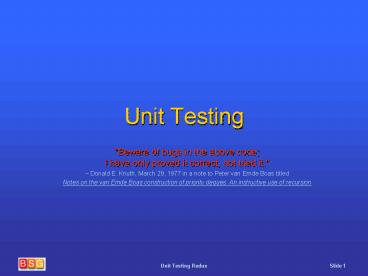Unit Testing - PowerPoint PPT Presentation
1 / 21
Title:
Unit Testing
Description:
I have only proved it correct, not tried it. ... Notes on the van Emde Boas construction of priority deques: An instructive use of recursion ... – PowerPoint PPT presentation
Number of Views:40
Avg rating:3.0/5.0
Title: Unit Testing
1
Unit Testing
- "Beware of bugs in the above code I have only
proved it correct, not tried it." - Donald E. Knuth, March 29, 1977 in a note to
Peter van Emde Boas titled - Notes on the van Emde Boas construction of
priority deques An instructive use of recursion
2
Unit Test What is it?
- A unit test is a method used to verify that
particular small unit of code (class) is working
properly. - Each test case is separate from the others so
that only the functions provided by the class are
evaluated.
3
Unit Test Characteristics
- AutomaticRequires neither intervention nor
manual setup - ThoroughCovers all important functionality,
including protected and private methods. Boundary
conditions should be checked. - RepeatableTests run with the same data return
the same results.
4
Unit Test Characteristics
- IndependentEach test is independent of the
results of previous tests and do not affect later
tests. - PerformantPerformance is good enough to support
running many tests at one session.
5
Unit Test Terminology
- A Test Fixture is a public instance class having
the TestClass attribute. - A Test is a non-static public method returning
void, accepting no parameters and having the Test
attribute. - A Test Context is an instance of the TestContext
class that persists throughout the life of a test
fixture.
6
Unit Test Terminology
- The Unit Test Runner is the code that
instantiates test fixtures, executes tests within
the fixture capturing output and exceptions
(assertions). - The Visual Studio Test Manager manages lists of
tests and fixtures to be submitted to the test
runner.
7
Unit Test Lifecycle
8
Unit Test Lifecycle
9
Unit Test Lifecycle
10
Life Cycle of a Unit Test Fixture
- An instance of the unit test runner is created
(either through VS or MSTest) - The test runner loads the test fixture and
inspects the test attributes using reflection. - From the test information, a test context
instance is created. This instance exists
throughout the life of the text fixture. - The assembly and class initialize methods are
called (static methods with AssemblyIntitialize
and ClassInitialize attributes).
11
Life Cycle of a Unit Test Fixture
- For each test (method) in the fixture, the
following RUN procedure occurs - An instance of the test fixture is created.
- A copy of the test context is passed to the
fixture instance. Instance information is now in
the test context. - The initialize method is called (a method with
the TestInitialize attribute). - The test method is invoked
- The cleanup method is called (a method with the
TestCleanup attribute).
12
Life Cycle of a Unit Test Fixture
- When all tests have run (or until the runner
terminates) - The class cleanup method (a static method with
the ClassCleanup attribute) is called. - The assembly cleanup method (a static method with
the AssemblyCleanup attribute) is called.
13
Life Cycle of a Unit Test Fixture
- If the test has a data source associated with it,
then the following occurs - While there are more rows in the data source,
populate the DataRow property with the next row
in the data source and then execute the RUN
procedure. - If a test throws an exception (via an assertion
or otherwise), the test is terminated with a
failure.
14
Testing Non-Public Methods
- Visual Studio uses reflection to create accessor
classes the file is VSGenCodeAccessors.cs do
not modify! - It has the same namespace as your test container
(test project) - Modify Visual Studio generated code within your
test method for readability.
15
Testing Non-Public Methods
- Create a instance of your class using the public
constructor. - Pass the object to accessor constructor.
- Call methods on the returned accessor.
_matrix new Matrix(new Collectionltstringgt(heade
rLabels)) Digatto_Covering_Dlx_MatrixAccessor
matrix new Digatto_Covering_Dlx_MatrixAccessor(_
matrix) matrix.PopulateRow(new
Collectionltstringgt(new string "C", "E", "F"
))
16
Best Practices
- Use the test context to store information that
must be shared by different tests. The Properties
property returns an IDictionary
object.TotalAgents1 - ControllerNameBXLEVARO
- AgentWeighting100
- AgentNameBXLEVARO
- TestDeploymentDirC\Documents and
Settings\richard.levaro\Local Settings\Application
Data\VSEqtDeploymentRoot\f4e70d35-26e9-4c28-96c9-
9a1891bf72bc\Out - AgentId1
- TestLogsDirC\Documents and Settings\richard.leva
ro\Local Settings\Application Data\VSEqtDeployment
Root\f4e70d35-26e9-4c28-96c9-9a1891bf72bc\In\BXLEV
ARO - TestDirC\Documents and Settings\richard.levaro\L
ocal Settings\Application Data\VSEqtDeploymentRoot
\f4e70d35-26e9-4c28-96c9-9a1891bf72bc - TestNameAddBookTest
- To include output in the test details, use the
WriteLine method of the test context. - Use the initialize and cleanup methods
17
Best Practices
- Dont test the framework (or Hibernate)
- Do test your algorithms create mock objects if
necessary - Do use unit testing as software scaffolding
during development and then migrate to a unit
test - Dont test trivia (Properties that dont do
anything)
18
Best Practices
- Visual Studio places the test project in the same
location as the source. - Create the test project first and then add tests
to it. - Use the Test Tools toolbar
19
Integration with Team Suite
- MSTest allows unit tests to be run as part of the
build project. - Create work items based upon failed results.
20
Documentation
Microsoft.VisualStudio.TestTools.UnitTesting
- Contains all documentation for Assert methods
- Attribute documentation
- Found in Team Test API under Team Edition for
Testers - Other namespaces implement load testing, Web
testing and others
21
Theres More
- Data-driven tests and how to create them
- Code coverage
- Detailed Team System integration publishing
test results































